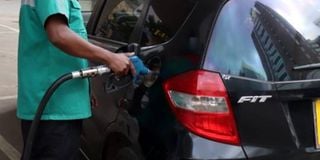Premium
More relief as pump prices record a further drop in latest Epra review

A pump attendant serves a customer at a petrol station in Nairobi. A litre of super petrol will now retail at Sh5 less, same as diesel in the lastest Epra review.
Kenyans will enjoy reduced fuel prices for the second month in a row with the national energy regulator announcing slashed pump prices for the month ending February 14, 2024.
In a statement by the Energy and Petroleum Regulatory Authority (Epra) on Sunday, a litre of super petrol will now retail at Sh5 less, same as diesel while a litre of kerosene will cost Sh4.82 per less.
"In the period under review, the maximum allowed petroleum pump price for Super Petrol, Diesel and Kerosene decrease by Sh5.00, Sh5.00 and Sh4.82 per litre respectively," read in part the statement.
With the announcement, in Nairobi, a litre of super petrol will retail at Sh207, diesel at Sh196.47, and kerosene at Sh194.23.
Previously, a litre of super petrol and diesel currently cost Sh212.36, and Sh201.47, respectively in Nairobi.
Epra director-general Daniel Kiptoo said the new prices are inclusive of the 16 percent Value Added Tax (VAT) as outlined by the Finance Act 2023, the Tax Laws (Amendment) Act 2020, and the revised rates for exercise duty adjusted for inflation.
He added that the price of diesel has been cross-subsidised with that of super petrol.
The last time the price of diesel fell below Sh200 was in August last year at Sh179.67 while that of premium was Sh195.53.
The drops will further help reduce the cost of living and help the government contain growing public outrage.
Inflation - a measure of the cost of living - fell to 6.6 percent this month from 6.8 percent a month earlier.
Kenya's economy is driven by diesel and manufacturers of goods, service providers and power generators are expected to factor the drop in fuel prices into the cost of their goods and services.
Sunday's prices, which will be in effect for a month until February 14, came as the landed cost of petroleum products fell by as much as nine per cent.
Diesel marked the highest drop in landed costs at 9.06 per cent to $751.15 per barrel last month from $826.01 per barrel in November, while super fell 2.4 per cent to $677.78 per barrel from $694.44 per barrel in the period.
Kerosene landed costs fell 4.33 per cent to 727 per barrel last month from $759.93 per barrel in November.
Global prices of Murban crude have been falling in recent months due to slowing demand in major economies, particularly the US and China.
President William Ruto and Mr Kiptoo recently said pump prices would continue to fall for the foreseeable future, offering hope to Kenyans struggling with the high cost of living.
But a sharp weakening of the shilling against the dollar has also denied Kenyans a further reduction in fuel prices.
In the latest review, Epra used an exchange rate of Sh158.81 to the dollar, compared to the rate of Sh148.98 to the dollar used in August last month.
Like other imports, oil marketing companies pay for imported fuel using dollars, highlighting why the free-falling shilling has denied Kenyans a bigger drop in pump prices even as the cost of murban crude continues to fall globally.






